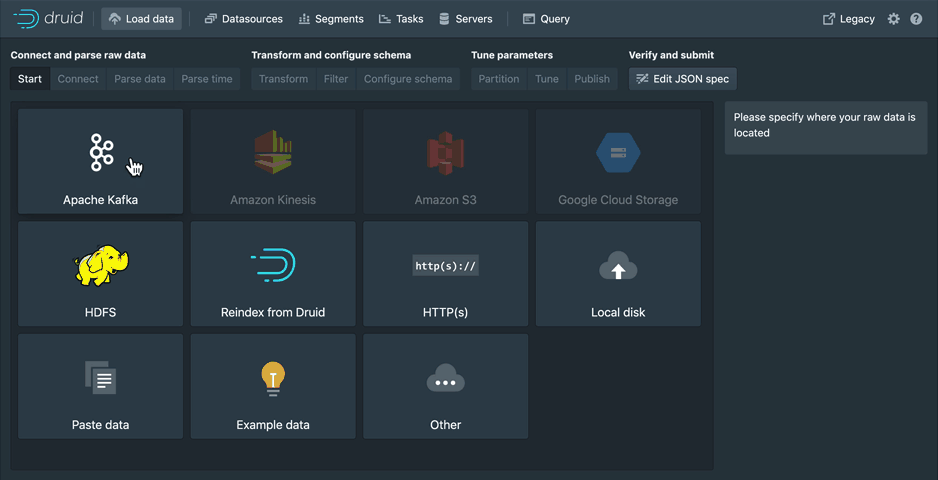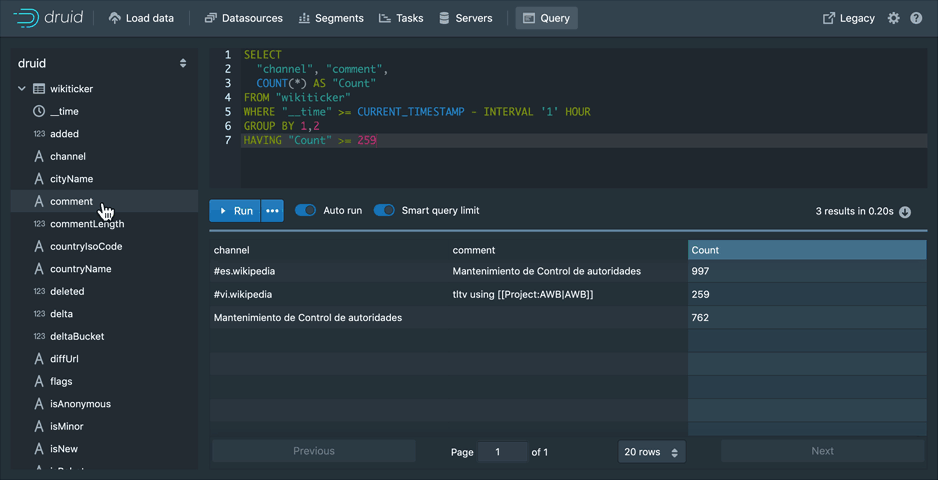* Direct UTF-8 access for "in" filters. Directly related: 1) InDimFilter: Store stored Strings (in ValuesSet) plus sorted UTF-8 ByteBuffers (in valuesUtf8). Use valuesUtf8 whenever possible. If necessary, the input set is copied into a ValuesSet. Much logic is simplified, because we always know what type the values set will be. I think that there won't even be an efficiency loss in most cases. InDimFilter is most frequently created by deserialization, and this patch updates the JsonCreator constructor to deserialize directly into a ValuesSet. 2) Add Utf8ValueSetIndex, which InDimFilter uses to avoid UTF-8 decodes during index lookups. 3) Add unsigned comparator to ByteBufferUtils and use it in GenericIndexed.BYTE_BUFFER_STRATEGY. This is important because UTF-8 bytes can be compared as bytes if, and only if, the comparison is unsigned. 4) Add specialization to GenericIndexed.singleThreaded().indexOf that avoids needless ByteBuffer allocations. 5) Clarify that objects returned by ColumnIndexSupplier.as are not thread-safe. DictionaryEncodedStringIndexSupplier now calls singleThreaded() on all relevant GenericIndexed objects, saving a ByteBuffer allocation per access. Also: 1) Fix performance regression in LikeFilter: since #12315, it applied the suffix matcher to all values in range even for type MATCH_ALL. 2) Add ObjectStrategy.canCompare() method. This fixes LikeFilterBenchmark, which was broken due to calls to strategy.compare in GenericIndexed.fromIterable. * Add like-filter implementation tests. * Add in-filter implementation tests. * Add tests, fix issues. * Fix style. * Adjustments from review. |
||
|---|---|---|
| .github | ||
| .idea | ||
| benchmarks | ||
| cloud | ||
| codestyle | ||
| core | ||
| dev | ||
| distribution | ||
| docs | ||
| examples | ||
| extendedset | ||
| extensions-contrib | ||
| extensions-core | ||
| helm/druid | ||
| hll | ||
| hooks | ||
| indexing-hadoop | ||
| indexing-service | ||
| integration-tests | ||
| licenses | ||
| processing | ||
| publications | ||
| server | ||
| services | ||
| sql | ||
| web-console | ||
| website | ||
| .asf.yaml | ||
| .backportrc.json | ||
| .codecov.yml | ||
| .dockerignore | ||
| .gitignore | ||
| .lgtm.yml | ||
| .travis.yml | ||
| CONTRIBUTING.md | ||
| LABELS | ||
| LICENSE | ||
| NOTICE | ||
| README.md | ||
| README.template | ||
| check_test_suite.py | ||
| check_test_suite_test.py | ||
| licenses.yaml | ||
| owasp-dependency-check-suppressions.xml | ||
| pom.xml | ||
| upload.sh | ||
README.md
Website | Documentation | Developer Mailing List | User Mailing List | Slack | Twitter | Download
Apache Druid
Druid is a high performance real-time analytics database. Druid's main value add is to reduce time to insight and action.
Druid is designed for workflows where fast queries and ingest really matter. Druid excels at powering UIs, running operational (ad-hoc) queries, or handling high concurrency. Consider Druid as an open source alternative to data warehouses for a variety of use cases. The design documentation explains the key concepts.
Getting started
You can get started with Druid with our local or Docker quickstart.
Druid provides a rich set of APIs (via HTTP and JDBC) for loading, managing, and querying your data. You can also interact with Druid via the built-in console (shown below).
Load data
Load streaming and batch data using a point-and-click wizard to guide you through ingestion setup. Monitor one off tasks and ingestion supervisors.
Manage the cluster
Manage your cluster with ease. Get a view of your datasources, segments, ingestion tasks, and services from one convenient location. All powered by SQL systems tables, allowing you to see the underlying query for each view.
Issue queries
Use the built-in query workbench to prototype DruidSQL and native queries or connect one of the many tools that help you make the most out of Druid.
Documentation
You can find the documentation for the latest Druid release on the project website.
If you would like to contribute documentation, please do so under
/docs in this repository and submit a pull request.
Community
Community support is available on the druid-user mailing list, which is hosted at Google Groups.
Development discussions occur on dev@druid.apache.org, which you can subscribe to by emailing dev-subscribe@druid.apache.org.
Chat with Druid committers and users in real-time on the Apache Druid Slack channel. Please use this invitation link to join and invite others.
Building from source
Please note that JDK 8 or JDK 11 is required to build Druid.
For instructions on building Druid from source, see docs/development/build.md
Contributing
Please follow the community guidelines for contributing.
For instructions on setting up IntelliJ dev/intellij-setup.md







